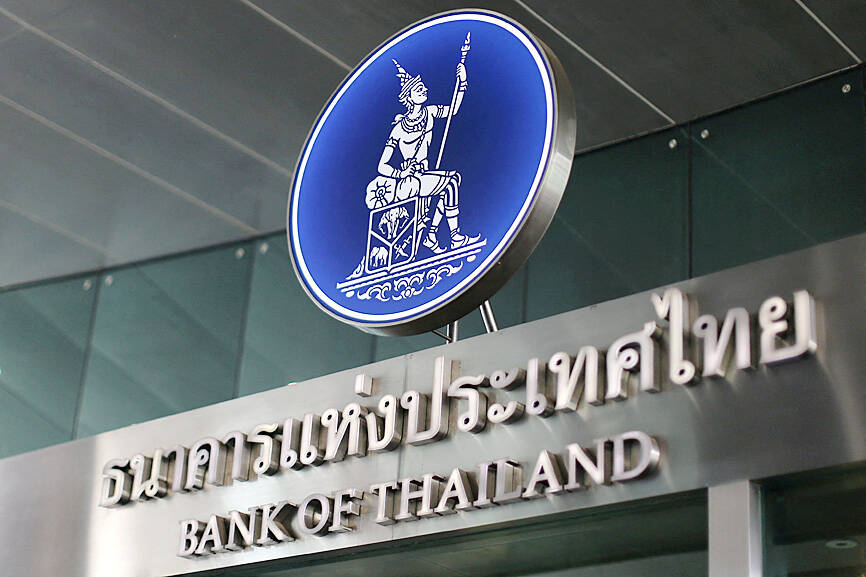The Bank of Thailand expects inflation to stay within the 1 percent to 3 percent target range in the next two years, Governor Sethaput Suthiwartnarueput said, describing the band as appropriate and supportive of the nation’s growth potential.
The inflation target, which has been kept for a fifth straight year, has “a proven track record of anchoring medium-term inflation expectations” and provides “sufficient flexibility towards accommodating inflation volatility from external and supply-side shocks,” the central bank chief said in a statement, days after the Cabinet approved the monetary policy target for next year.
Thailand’s inflation remained below the target for a sixth straight month last month at 0.95 percent, which has added pressure for the monetary authority to reduce borrowing costs. Even so, the Bank of Thailand on Wednesday last week left its key interest rate unchanged at 2.25 percent, following a surprise cut in October.

Photo: Reuters
“The MPC [Monetary Policy Committee] assessed that average headline inflation for 2025 and 2026 would remain within target range, although during some periods headline inflation might move temporarily outside of the target range due to economic shocks,” Sethaput said.
The Bank of Thailand and the Ministry of Finance have agreed to hold regular discussions to ensure coordinated fiscal and monetary policies, he said.
“In case of necessary or fitting circumstances, the Minister of Finance and the MPC may, by mutual agreement, revise the monetary policy target before proposing the new target to the Cabinet for approval,” he said.
Monetary policy would aim to foster sustainable growth and financial stability, and this involves appropriately setting the policy interest rates with support of other tools to help prevent excessive exchange rate volatility, he added.
There are no explicit commitments in the agreement to boost inflation to a midpoint target of 2 percent, as pushed by Thai Minister of Finance Pichai Chunhavajira.
If the average headline inflation in the past 12 months or the forecast for the next 12 months falls outside the target, the MPC would issue an open letter to the finance minister that would detail the reasons for the breach, the monetary policy actions undertaken in the past, as well as proposed steps for guiding inflation back on target, the statement said.

A proposed 100 percent tariff on chip imports announced by US President Donald Trump could shift more of Taiwan’s semiconductor production overseas, a Taiwan Institute of Economic Research (TIER) researcher said yesterday. Trump’s tariff policy will accelerate the global semiconductor industry’s pace to establish roots in the US, leading to higher supply chain costs and ultimately raising prices of consumer electronics and creating uncertainty for future market demand, Arisa Liu (劉佩真) at the institute’s Taiwan Industry Economics Database said in a telephone interview. Trump’s move signals his intention to "restore the glory of the US semiconductor industry," Liu noted, saying that

On Ireland’s blustery western seaboard, researchers are gleefully flying giant kites — not for fun, but in the hope of generating renewable electricity and sparking a “revolution” in wind energy. “We use a kite to capture the wind and a generator at the bottom of it that captures the power,” said Padraic Doherty of Kitepower, the Dutch firm behind the venture. At its test site in operation since September 2023 near the small town of Bangor Erris, the team transports the vast 60-square-meter kite from a hangar across the lunar-like bogland to a generator. The kite is then attached by a

Foxconn Technology Co (鴻準精密), a metal casing supplier owned by Hon Hai Precision Industry Co (鴻海精密), yesterday announced plans to invest US$1 billion in the US over the next decade as part of its business transformation strategy. The Apple Inc supplier said in a statement that its board approved the investment on Thursday, as part of a transformation strategy focused on precision mold development, smart manufacturing, robotics and advanced automation. The strategy would have a strong emphasis on artificial intelligence (AI), the company added. The company said it aims to build a flexible, intelligent production ecosystem to boost competitiveness and sustainability. Foxconn

Leading Taiwanese bicycle brands Giant Manufacturing Co (巨大機械) and Merida Industry Co (美利達工業) on Sunday said that they have adopted measures to mitigate the impact of the tariff policies of US President Donald Trump’s administration. The US announced at the beginning of this month that it would impose a 20 percent tariff on imported goods made in Taiwan, effective on Thursday last week. The tariff would be added to other pre-existing most-favored-nation duties and industry-specific trade remedy levy, which would bring the overall tariff on Taiwan-made bicycles to between 25.5 percent and 31 percent. However, Giant did not seem too perturbed by the